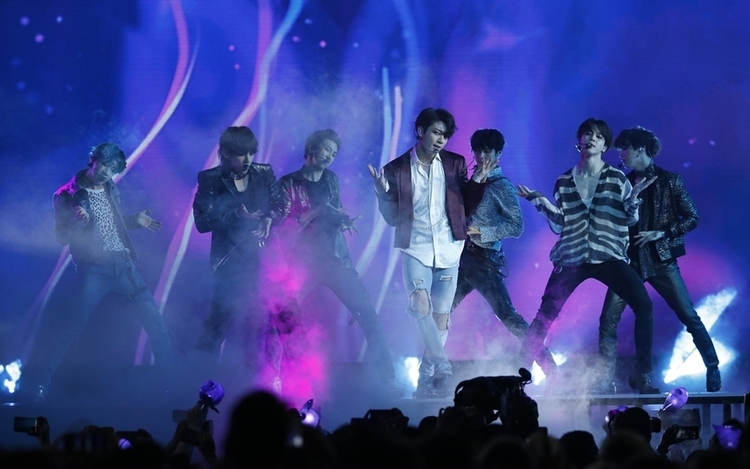Posted on : Nov.12,2018 17:47 KST
 |
|
BTS performs during the 2018 Billboard Music Awards in Las Vegas on May 20.
|
The abrupt cancellation of scheduled Japanese TV appearance by the globally popular music group BTS offers a sour taste of the current state of South Korea-Japan relations, a glimpse of the increasing gap between the two sides following a recent Supreme Court ruling on forced labor conscription.
Reports on Nov. 11 also said the Shinzo Abe administration plans to uniformly use the official term “workers from the Korean Peninsula” instead of “conscripted workers” to refer to the conscripted Koreans.
While the specifics remain unknown, fears of denunciations and demonstrations by right-wingers appear to have been a factor in TV Asahi’s decision to pull the plug on the BTS performance the day before it was scheduled to air live. A precedent for this already exists in Japan, with viewership plunging for Fuji TV in 2011 in the wake of demonstrations and attacks over its Korean Wave-heavy programming.
It is of course terribly narrow-minded to take issue with a National Liberation Day T-shirt that one of the BTS members wore over a year ago. The photograph in question drew little interest before it suddenly became an issue last month after being highlighted on a site showing articles about South Korea. Obviously, it is not appropriate to use a photograph of a human tragedy like the atomic bomb blasts to represent Japan’s war defeat, but it was not intended as “anti-Japan”; still less is it the responsibility of the BTS member in question.
Reports indicate that NHK and other networks have aborted their plans to ask BTS to appear. We hope they realize that a response like this will only draw the world’s attention to the issue of Japan’s past illegal colonial occupation of Korea.
At times like this, however, South Koreans should also remember that people hold many different views even within Japan. Some have criticized the BTS cancellation decision as “provincial” and “disappointing.” Conscientious Japanese people played a large role in the forced labor issue reaching its current point thanks to their unstinting moral and practical support since victims first filed suit in Japanese court over 20 years ago.
A case in point is the organization Collective Action to Address the Forced Mobilization Issue and Resolve the Past, which was established by around 20 groups in Tokyo on Nov. 11. At a time of increasing conservatism and intensifying anti-Korean sentiments, these people have had a major impact working through difficult times with the belief that forced conscription was a matter of human dignity being stripped away by a colonial occupier.
Right-wing forces and the Japanese government certainly deserve the criticisms and demands they are facing, but we should not let go of trying to reach out and unite with Japanese consciences. With the Japanese government recently announcing its hopes for continued exchanges in culture and sports, we look forward to a forward-thinking stance. We also hope the Japanese tour that BTS will be beginning on Nov. 13 can go some small way in bridging differences between South Korean and Japanese hearts.
Please direct comments or questions to [english@hani.co.kr]






